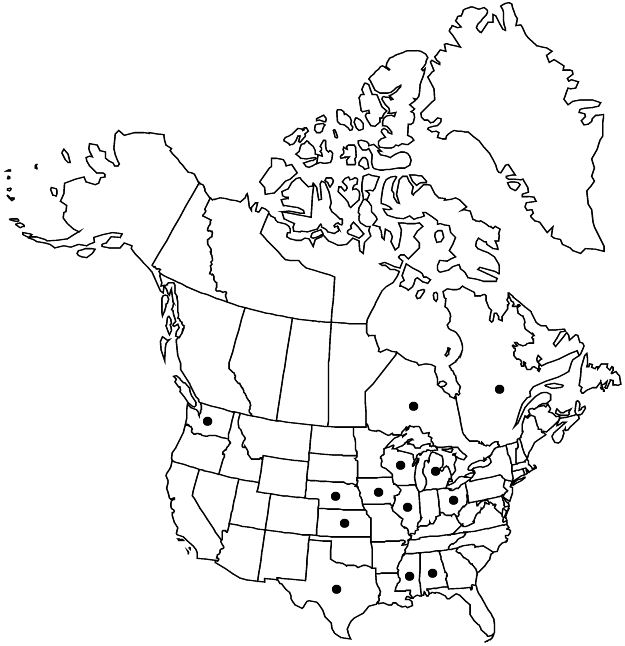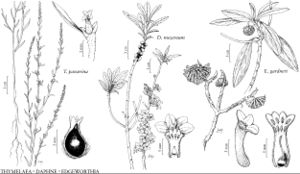Difference between revisions of "Thymelaea passerina"
Syn. Anal. Fl. Paris ed. 2, 360. 1859.
FNA>Volume Importer |
imported>Volume Importer |
||
| (6 intermediate revisions by 2 users not shown) | |||
| Line 10: | Line 10: | ||
|special_status={{Treatment/ID/Special_status | |special_status={{Treatment/ID/Special_status | ||
|code=F | |code=F | ||
| − | |label= | + | |label=Illustrated |
}}{{Treatment/ID/Special_status | }}{{Treatment/ID/Special_status | ||
|code=I | |code=I | ||
|label=Introduced | |label=Introduced | ||
}} | }} | ||
| − | |basionyms={{Treatment/ID/ | + | |basionyms={{Treatment/ID/Basionym |
|name=Stellera passerina | |name=Stellera passerina | ||
|authority=Linnaeus | |authority=Linnaeus | ||
| + | |rank=species | ||
| + | |publication_title=Sp. Pl. | ||
| + | |publication_place=1: 559. 1753 | ||
}} | }} | ||
|synonyms= | |synonyms= | ||
| Line 34: | Line 37: | ||
|elevation=10–300 m | |elevation=10–300 m | ||
|distribution=Ont.;Que.;Ala.;Ill.;Iowa;Kans.;Mich.;Miss.;Nebr.;Ohio;Tex.;Wash.;Wis.;s Europe;Mediterranean regions. | |distribution=Ont.;Que.;Ala.;Ill.;Iowa;Kans.;Mich.;Miss.;Nebr.;Ohio;Tex.;Wash.;Wis.;s Europe;Mediterranean regions. | ||
| − | |discussion=<p>Thymelaea passerina is sometimes accidentally introduced in fodder and spreads quickly. It is sometimes mistaken for one of the delicate species of Polygala.</p> | + | |discussion=<p><i>Thymelaea passerina</i> is sometimes accidentally introduced in fodder and spreads quickly. It is sometimes mistaken for one of the delicate species of Polygala.</p> |
|tables= | |tables= | ||
|references= | |references= | ||
| Line 43: | Line 46: | ||
-->{{#Taxon: | -->{{#Taxon: | ||
name=Thymelaea passerina | name=Thymelaea passerina | ||
| − | |||
|authority=(Linnaeus) Cosson & Germain | |authority=(Linnaeus) Cosson & Germain | ||
|rank=species | |rank=species | ||
| Line 57: | Line 59: | ||
|publication title=Syn. Anal. Fl. Paris ed. | |publication title=Syn. Anal. Fl. Paris ed. | ||
|publication year=1859 | |publication year=1859 | ||
| − | |special status= | + | |special status=Illustrated;Introduced |
| − | |source xml=https:// | + | |source xml=https://bitbucket.org/aafc-mbb/fna-data-curation/src/2e0870ddd59836b60bcf96646a41e87ea5a5943a/coarse_grained_fna_xml/V6/V6_709.xml |
|genus=Thymelaea | |genus=Thymelaea | ||
|species=Thymelaea passerina | |species=Thymelaea passerina | ||
Latest revision as of 22:23, 5 November 2020
Stems green or yellow-green, turning red in fall. Leaves upright; petiole to 1 mm; blade 0.6–1.5 × 0.1–0.2 cm, stiff, herbaceous to coriaceous, apex acute. Inflorescences cymose, 1–7-flowered; bracts 1.5 cm, with tuft of white trichomes at base. Flowers: hypanthium green to yellow, tubular, becoming urceolate, 2–3 mm, appressed-hairy; calyx lobes minute; stamens: distal whorl inserted at throat; distal anthers subexserted; ovary 0.75 mm, apex hairy; style 0.7–0.8 mm, glabrous, becoming ± eccentric in fruit; stigma exserted. Capsules pyriform. 2n = 18.
Phenology: Flowering summer (late Jun–Aug); fruiting summer–fall (Jul–early Sep).
Habitat: Dry, disturbed ground, including prairies and old fields
Elevation: 10–300 m
Distribution

Ont., Que., Ala., Ill., Iowa, Kans., Mich., Miss., Nebr., Ohio, Tex., Wash., Wis., s Europe, Mediterranean regions.
Discussion
Thymelaea passerina is sometimes accidentally introduced in fodder and spreads quickly. It is sometimes mistaken for one of the delicate species of Polygala.
Selected References
None.
